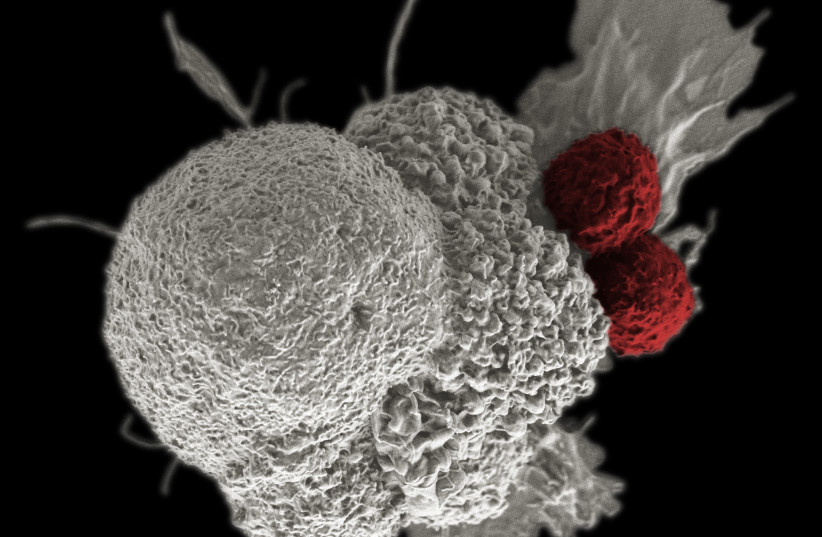Israel is 58th place in the world in the incidence rate of prostate cancer disease in men, according to the Health Ministry, which released this statistic before the end of September, which is World Prostate Cancer Awareness Month.
It was also revealed that, while the incidence rate is relatively high, the death rate from the disease in Israel compared to the rest of the world is very low, ranking 143. This indicates a high survival rate due to the expertise of the health system for diagnosis and treatment.
In 2019 (from when the latest Cancer Registry figures were available), 2,493 men were diagnosed with invasive prostate cancer, of whom 2,355 were Jews (94.5%) and 138 Arabs (5.55%).
At the end of 2019, there were 10,725 prostate cancer patients living in Israel who were diagnosed between 2015 and 2019 and who have recovered or are still coping with the disease. Of these, 10,123 are Jews and 602 are Arabs. As of 2015, the incidence of the disease is stable, and there has been no increase in the incidence of this malignancy.
What are the chances of contracting prostate cancer?
Prostate cancer is the most common cancer among men in Israel, but the fourth most common in terms of cancer mortality. In 2019, 493 men died from the disease, with the majority of deaths occurring in men aged 75 and over. Prostate cancer mortality trends in the years 1996 to 2019 indicated a significant decrease in rates. The average age of men who died from prostate cancer was 81.1 years old among Jewish men and 77.6 among Arab men.

The main risk factors for the disease are age, family history of the disease and certain genetic mutations. Other possible risk factors, which are still controversial, are obesity, tobacco smoking and enlargement and inflammation of the gland. Men with a family history of prostate, breast, ovarian, colon or pancreatic cancers may be at an increased risk of prostate cancer. Inherited mutations of the BRCA1 or BRCA2 genes raise the risk of breast, ovarian and prostate cancer in some families. Studies suggest that there may be a link between diet and the cause or prevention of prostate cancer.
Exposure to certain chemicals such as pesticides and herbicides may have higher than average rates of prostate cancer, and recent studies show that firefighters are at a 28% greater risk to develop prostate cancer compared to the general population.
The risk of contracting prostate cancer is higher among Jewish men compared to Arab men, and this increases with age; less than 1% of patients are diagnosed under the age of 50. The majority of men diagnosed with the cancer were between the ages of 70 and 74 in Jewish men and 75 and older in their Arab counterparts.
The number of new cases in the years 1996 to 2007 indicated a significant increase in Jewish men, and there was a significant decrease in the years 2008 to 2014. From 2015 onwards, no significant change was observed.
A similar trend was also observed among the Arab men – a clear increase until 2005 and a clear decrease from 2005 onwards. However, the disease rate among Jewish men was higher than among Arab men during the entire period.
The ministry did not explain why Arab men are at a lower risk, but genetics could have a role. In the US, for example, African American men are more than twice as likely to be diagnosed with prostate cancer and to die from the disease as whites are.
What are the warning symptoms of prostate cancer?
Unfortunately, there are often no early warning signs of prostate cancer, and without regular screening, it can go undetected for years. In some cases, as the tumor grows, it may exert pressure on the urethra, blocking the flow of urine from the bladder, causing urinary symptoms. Occasionally, the first warning sign may be blood in the urine. Other symptoms include frequent urination (especially at night); a weak urinary stream; interruption of the urinary stream (starting and stopping); pain or burning during urination; bone pain in the hips, ribs or back; or back pain.
New tests or biomarkers (a biological molecule found in blood, body fluids or tissues that is a sign of a normal or abnormal condition or disease) currently under development may help detect prostate cancer in the future. Markers may also be used to see how the body responds to a treatment for a disease.
The observed decrease in the incidence of the disease in Israeli men in recent years likely reflects the recommendations for the prostate-specific antigen (PSA) blood test for early detection of prostate cancer, which resulted from the progress of research in the field.
In Israel, it was recommended for older men to perform a PSA test since the early 1990s. In 2002, updated guidelines were published, which did not recommend performing the test on men aged 75 and over. In 2008, the recommendations were updated again and ordered the avoidance of proactive screening in the general population at normal risk of the disease. While screening for prostate cancer does not provide a diagnosis, it provides valuable information to aid in finding the disease early. Digital rectal exams can also provide warning signs.
The relative five-year survival rate from the disease (in relation to a population group that matches them in gender and age during the same time period) is at a very high rate among Jews diagnosed between 2008 and 2014 and stands at 97.6%. In Arab men, who were diagnosed at the same time, the relative five-year survival rate is 87.4%.
These rates are high compared to the corresponding rates among those who were diagnosed in 2002 to 2007 (96.0% and 2.9%, respectively). It is possible that these differences reflect, among other things, a higher rate of overdiagnosis in Jewish men compared to Arab men, the ministry said.
